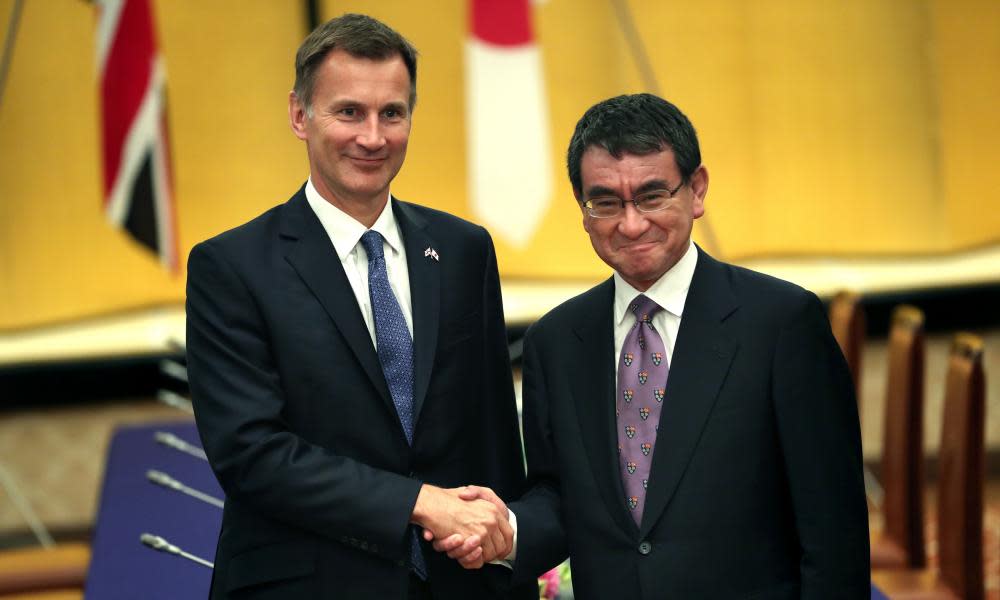Hunt and Fox's Japanese fumble is a sign of UK's weakness

It takes a lot to anger the unfailingly polite, anglophile Japanese. But Liam Fox, the international trade secretary, and Jeremy Hunt, the foreign secretary, appear to have managed it with their ill-judged attempt to hustle Tokyo into a quick-fire Brexit trade deal.
The diplomatic fumble has highlighted rapidly escalating difficulties facing “global Britain” – the government’s nebulous vision for life after the EU – in forging new business and trade relationships around the world without an agreed post-Brexit strategy.
Leading Brexiters such as Fox, David Davis and Nigel Farage predicted the process would be quick and easy, but events are proving them wrong. With 29 March fast approaching, Britain has replaced only seven of the EU’s 69 collective preferential trade deals.
The “magnificent seven” comprise Switzerland, Chile, Mauritius, Madagascar, Zimbabwe, the Faroe Islands and the Seychelles. Together, they account for a mere £16bn out of a total of £117bn in British trade with EU-partnered countries.
In contrast, preferential arrangements with bigger EU partners such as Japan, South Korea, Turkey and Norway have not been replaced, nor does it appear they will be before the deadline.
With market analysts warning a no-deal Brexit is a growing possibility, pressure on Fox is intensifying. This may explain last week’s clumsy warning to Japan, in a letter co-authored with Hunt, that “time is of the essence”.
Like his predecessors, Shinzō Abe, Japan’s prime minister, has pursued a close diplomatic and security relationship with Britain. Japanese businesses and carmakers have invested heavily. So officials in Tokyo reportedly took strong exception to the Fox-Hunt suggestion of foot-dragging, suggesting it smacked of arrogance.
Fox was already struggling with tougher than expected Japanese negotiating tactics. Given widespread perceptions of British weakness, bordering on desperation, other countries, less well disposed than Japan, can be expected to take an even harder line.
The question of ministerial incompetence aside, Britain is further disadvantaged by a lack of trade talks specialists – a point made by the Japanese – and ongoing domestic political divisions.
Add to that well-founded concerns about a contracting global economy, the US-China trade war and a broader sense that Britain’s standing on the world stage is in decline, and the future negotiating environment looks hostile.
Mark Rutte, the Dutch prime minister, served up what he and others among Britain’s European friends see as an unpalatable truth. Britain is “a waning country” that is “too small to appear on the world stage on its own”, he said last week.
All this renders the task of creating new bilateral trade deals with the world’s largest economies, outside the EU’s 69-nation umbrella framework, ever more daunting.
China’s weekend decision to cancel high-levels talks over disobliging remarks by the defence secretary, Gavin Williamson, showed how vulnerable Britain is to geopolitical as well as financial pressure from the big emerging powers.
The UK’s dependence on Chinese investment, for example in nuclear power, is another weakness open to exploitation. Britain’s refusal to ostracise the Chinese telecoms giant Huawei may please Beijing but will infuriate the US. Was the decision influenced by Brexit considerations?
There could also be a high price to pay, in terms of political values and human rights, in obtaining deals from repressive regimes in China, Saudi Arabia and Turkey.
And Britain’s often unhappy colonial legacy must be factored in, too. Many in India will view London’s new neediness as a chance to redress old wrongs.
For his part, Donald Trump, a Brexit enthusiast, has criticised May for conceding too much to the EU while promising an expanded relationship. The US is already Britain’s biggest non-EU trade partner, and London clings rather pathetically to its so-called special relationship.
Money-minded, hard-nosed Trump is certain to drive a hard bargain, and there’s a real risk of bullying. Any agreement with the US could come with political as well as commercial and health and safety strings attached, for instance on Iran, where current policy diverges.
Trump’s deep hostility to to the World Trade Organization (“one of the worst deals ever”) means, meanwhile, that a no-deal default to WTO rules would not necessarily win Washington’s approval or support.
Such an outcome would truly leave Britain all at sea, lost and adrift somewhere between Europe and America.

 Yahoo News
Yahoo News 
